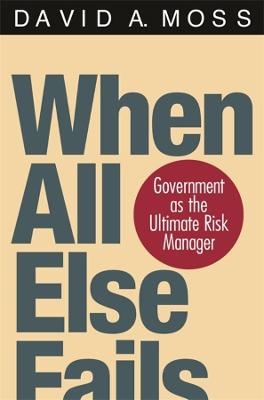
When All Else Fails
Harvard University Press (Verlag)
978-0-674-01609-5 (ISBN)
One of the most important functions of government—risk management—is one of the least well understood. Moving beyond the most familiar public functions—spending, taxation, and regulation—When All Else Fails spotlights the government’s pivotal role as a risk manager. It reveals, as never before, the nature and extent of this governmental function, which touches almost every aspect of economic life.
In policies as diverse as limited liability, deposit insurance, Social Security, and federal disaster relief, American lawmakers have managed a wide array of private-sector risks, transforming both the government and countless private actors into insurers of last resort. Drawing on history and economic theory, David Moss investigates these risk-management policies, focusing in particular on the original logic of their enactment. The nation’s lawmakers, he finds, have long believed that pervasive imperfections in private markets for risk necessitate a substantial government role. It remains puzzling, though, why such a large number of the resulting policies have proven so popular in a country famous for its anti-statism. Moss suggests that the answer may lie in the nature of the policies themselves, since publicly mandated risk shifting often requires little in the way of invasive bureaucracy. Well suited to a society suspicious of government activism, public risk management has emerged as a critical form of government intervention in the United States.
David A. Moss is the Paul Whiton Cherington Professor at Harvard Business School and the founder of the Tobin Project, a nonprofit research organization that has received the MacArthur Award for Creative and Effective Institutions. He has received the Student Association Faculty Award for outstanding teaching at the Harvard Business School eight times. Democracy: A Case Study grew out of a course he created for Harvard undergraduates and business school students that has been taught to the United States Congress and to state congresses and that is now being brought to high schools throughout America as part of the High School Case Method Project, which Professor Moss oversees at Harvard Business School.
Preface 1. Introduction 2. A Primer on Risk and Its History 3. Limited Liability 4. Money 5. Bankruptcy 6. Workers' Insurance 7. Social Security 8. Product Liability Law 9. Security for All 10. The Foundations of American Risk Management Policy Epilogue: Risk, Knowledge, and the Veil of Ignorance Notes Acknowledgments Index
| Erscheint lt. Verlag | 24.11.2004 |
|---|---|
| Zusatzinfo | 4 line illustrations, 13 tables |
| Verlagsort | Cambridge, Mass |
| Sprache | englisch |
| Maße | 156 x 235 mm |
| Themenwelt | Sozialwissenschaften ► Politik / Verwaltung ► Staat / Verwaltung |
| Wirtschaft ► Volkswirtschaftslehre ► Mikroökonomie | |
| ISBN-10 | 0-674-01609-2 / 0674016092 |
| ISBN-13 | 978-0-674-01609-5 / 9780674016095 |
| Zustand | Neuware |
| Haben Sie eine Frage zum Produkt? |
aus dem Bereich


